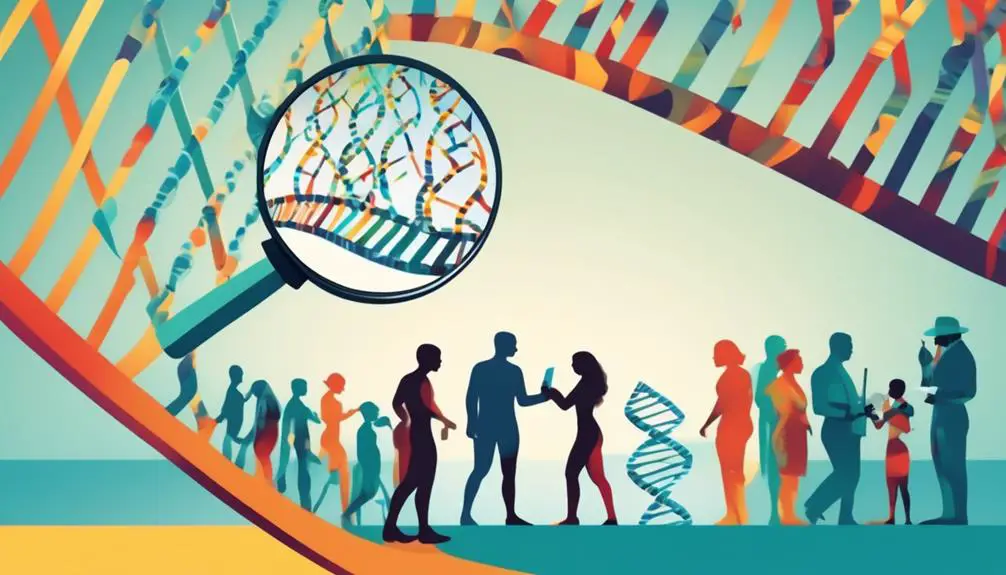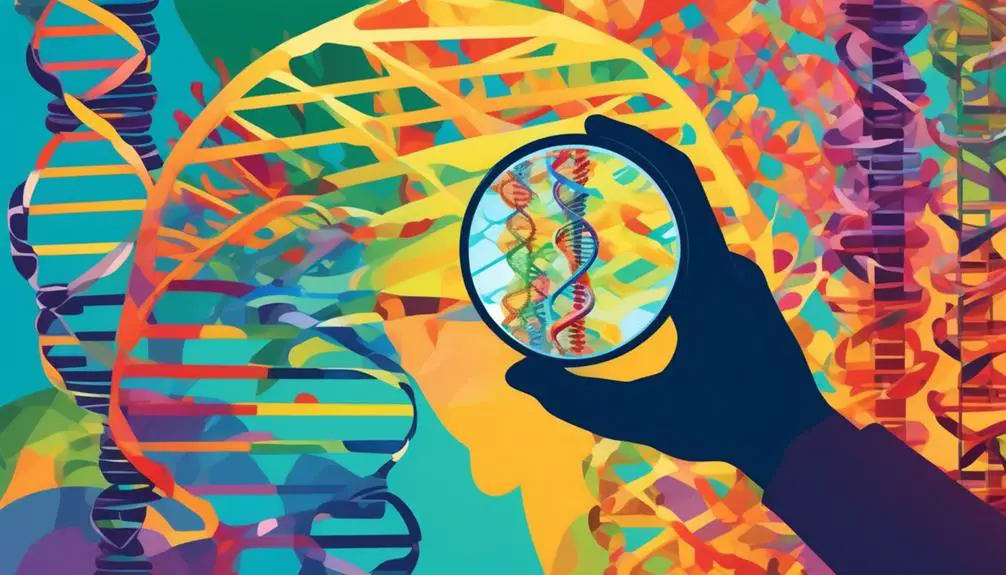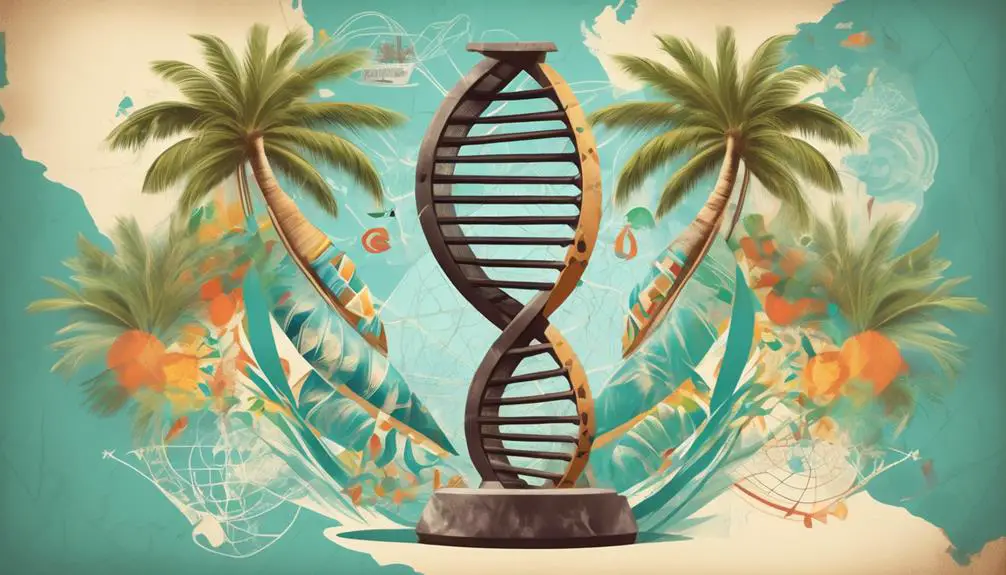I recall the time I discovered an old family photo in my grandmother’s attic, its borders tattered and hues diminished, yet the figures looking back appeared to murmur stories of our Caribbean heritage.
As a genealogy expert, my experience has taught me the importance of choosing the right DNA test to explore such rich lineage. I believe the best test is one that boasts a large database and can pinpoint regional specifics, helping to draw a vivid picture of one's ancestry.
It's not just about percentages; it's about connecting the dots of my family story, piece by intriguing piece.
Key Takeaways
- Importance of choosing the right DNA test for exploring Caribbean lineage
- AncestryDNA offers extensive collection of reference samples for Caribbean search
- Database size and diversity of reference samples affect accuracy of matches to Caribbean people and African ethnic groups
- Consider privacy and ethical considerations when choosing a DNA testing company
Understanding DNA Testing
When considering a DNA test, it's crucial to grasp not only what insights you might gain about your ancestry and family connections but also the potential implications for your privacy and personal data.
DNA testing services can provide ethnicity estimates and unveil your genetic makeup, which includes maternal and paternal lines crucial to tracing Caribbean ancestry. An autosomal DNA test allows you to compare your DNA with others to find genetic traits shared among relatives.
However, genetic testing companies' use of your data for purposes beyond DNA analysis, such as law enforcement investigations or monetization, raises privacy concerns. It's important to understand these risks before diving into your genetic journey.
Top Caribbean DNA Tests
If you're tracing your roots back to the Caribbean, AncestryDNA offers the most extensive collection of reference samples to aid in your search. With the AncestryDNA test, you're not just getting results; you're uncovering chapters of your Caribbean family history. DNA testing can provide a genetic profile that reflects the rich tapestry of Caribbean genealogy, shaped by the slave trade and the diverse peoples of African descent.
| Testing Company | Reference Samples | Ideal for |
|---|---|---|
| AncestryDNA | 1919 | African heritage tracing |
| Best DNA Test | Discounted price | Accurate Caribbean ancestry |
| 23andMe | Broad results | Wider genetic perspective |
Your DNA test results from these companies will deepen your understanding of your lineage, connecting you to a past that's both personal and expansive.
Evaluating Test Accuracy

Assessing the accuracy of a Caribbean DNA test requires scrutinizing the size of the testing company's database and the depth of their lineage analysis. You'll want the best DNA test that offers a comprehensive ancestry DNA testing experience. Here's what you should consider:
- Database Size: A larger sample size can mean more accurate matches to Caribbean people and African ethnic groups.
- Lineage Analysis: Look for tests that analyze both maternal and paternal lines, using mitochondrial DNA and the Y chromosome.
- Reference Samples: The quality and diversity of reference samples are crucial for genetic genealogy.
- Ancestry Test Focus: Some tests are tailored specifically to Caribbean ancestry, enhancing the relevance of your DNA sample results.
Choose wisely to uncover your roots with precision.
Privacy and Ethical Considerations
You should carefully consider the privacy and ethical implications before submitting your DNA for testing, as the handling of your genetic information can have far-reaching consequences. When choosing a DNA test kit, it's vital to understand how the company you choose will protect your DNA samples. Read their privacy policies carefully—your saliva sample contains sensitive genetic data that could reveal more than just ancestry information.
| Concern | Consideration |
|---|---|
| Data Storage | How is your genetic data stored and secured? |
| Data Sharing | Who has access to your DNA tests results? |
| Unexpected Results | Are you prepared for potentially sensitive information? |
| Law Enforcement | Will the company collaborate with law enforcement without your consent? |
| Ethical Use | How will the testing service use your DNA samples ethically? |
Be sure you're comfortable with these aspects before proceeding with testing.
Accessing and Interpreting Results

Having weighed the privacy and ethical considerations, let's focus on how to access and interpret your DNA test results effectively. With the best DNA testing, you'll discover various aspects of your ancestry and ethnic makeup. Here's how to make sense of the information:
- Utilize tools for interpreting results, like haplogroups and autosomal DNA segments, to understand your ancestral roots.
- Examine your Y chromosome data, if applicable, for insights into paternal ancestry, including African roots and European ancestry.
- Explore population groups and geographical origins to place your heritage in a broader historical context.
- Consult with experts to fully grasp complex genetic information and its implications on your family tree.
Frequently Asked Questions
Does Ancestry Show Caribbean Ancestry?
Yes, Ancestry does show Caribbean ancestry, reflecting the region's ethnic complexity, migrations patterns, and the colonial impact, including indigenous traces and slave trade influences on your genetic diversity and cultural DNA.
Which DNA Company Is Most Accurate for Ethnicity?
You'll find that ethnicity precision varies by company, with database size and regional specificity impacting test reliability. Look for genetic markers accuracy, privacy policies, community matching features, and scientific credibility when choosing.
What Is the Best DNA Test in the World?
You'll want a test with high DNA accuracy, extensive genetic markers, and robust global databases. Consider privacy concerns, health insights, ancestry mapping, ethnic variations, scientific advancements, and consumer reviews when comparing tests.
Which DNA Kit Is Best for Black People?
You'll want a DNA kit that highlights genetic diversity and traces the African Diaspora, revealing ancestral roots and cultural heritage linked to migration patterns and slave trade via genetic markers and population genetics.
Conclusion
You've explored the best DNA tests for Caribbean heritage, weighing accuracy, privacy, and result interpretation.
Now, take the plunge and unlock your unique genetic mosaic.
Remember, the best test offers detailed ethnicity breakdowns and a vast database.
So go ahead, discover your roots and connect with your ancestral community.
It's more than just data; it's a journey to self-discovery and a celebration of the rich tapestry that makes you, well, you.

Throughout his career, Andras Kovacs has developed a deep understanding of DNA and its applications in genealogy and genetic testing. He has helped thousands of individuals uncover their ancestral heritage, using cutting-edge DNA analysis to trace family lineages and reveal connections across generations.

